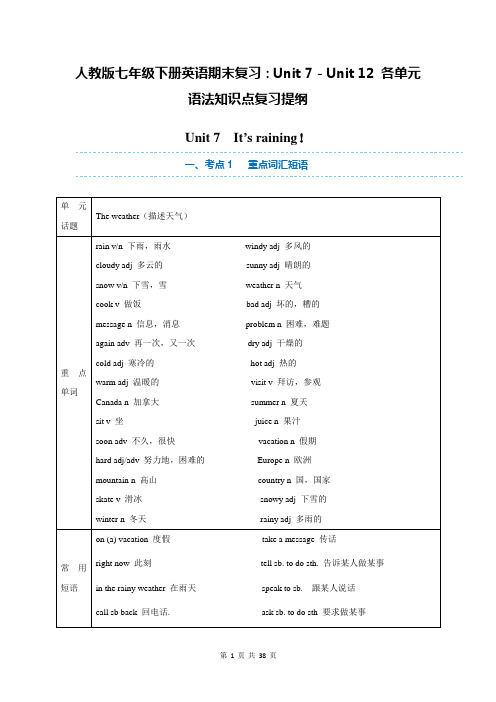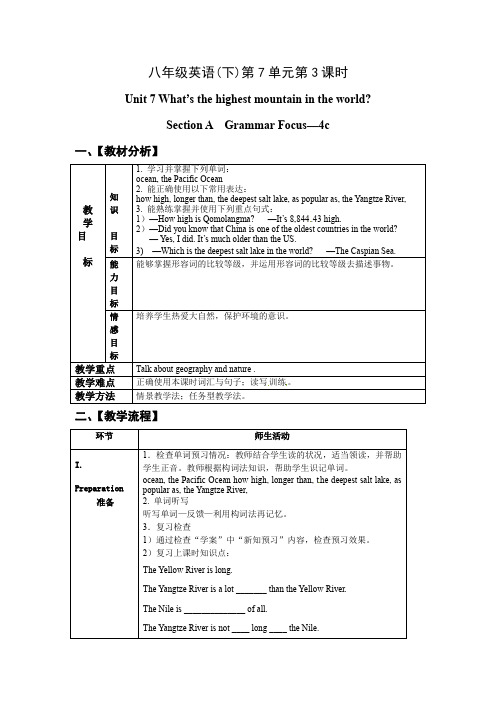Unit 7-2011
剑桥国际英语教程unit-7PPT课件

• (Where, who, what time, how.) • Where did you go? • Who did you go with? • What time did you go? • How did you like it?
-
11
• What do you do at home? • Where do want to do on the
• adj.西班牙的, 西班牙人的,
• n.西班牙语, 西班牙人
• His mother tongue is Spanish • 他的母语是西班牙语
-
9
Activities.
• what do you really want to do?
(shopping, go home, listen to music, have a blind date, go to a movie with sb, play sports)
-
13
• Hawaii [hɑ:‘waii:] n. 夏威夷
• Fantastic [fæ n'tæ stik]
• adj.极好的, 巨大的,
• We watched a fantastic play yesterday evening.
• 昨天晚上我们看了一场非常精彩的演出
• She's a fantastic swimmer.
• 他是个了不起的生意人
-
16
On vacation
• Where do you really want to go? Suppose you went there a few days (weeks, months) ago. Now answer your friends questions.
Unit 7 The Chaser综合英语3

Cultural Information
1. Proposal of Marriage • Often the proposal is a surprise. • In many Western cultures, the tradition has been for the man to propose to the woman. • In Ireland, there is a custom that on leap day woman can propose to the man.
Cultural Information
Entreat me not to leave you, or to return from following after you, For where you go I will go, and where you stay I will stay. Your people will be my people, and your God will be my God. And where you die, I will die and there I will be buried. May the Lord do with me and more if anything but death parts you from me.
Cultural Information
2. Engagement
• An engagement is a promise to marry, and also the period of time between proposal and marriage — which may be lengthy or trivial.
Detailed Reading
人教版七年级下册英语期末复习:Unit 7-Unit 12 各单元语法知识点复习提纲(全面!)

人教版七年级下册英语期末复习:Unit 7-Unit 12 各单元语法知识点复习提纲Unit 7 It’s raining!一、考点1 重点词汇短语1 messagemessage为可数名词,意为“消息,信息”,take a message for sb.“为某人捎个口信”。
拓展:give sb. a message 捎信给某人,leave a message 留口信,get the message 明白对方的意思。
Can I take a message for him?当某人发现要找的人不在或接电话的人发现打电话者要找的人不在时,常用此语2 could 情态动词意为“能,可以“,表示请求许可,在语气上比can委婉客气,但这种句式的肯定回答用can。
Could you just tell him to call me back?3 call及物动词,意为“打电话给”。
call sb. (up) “打电话给某人”,call sb. at +电话号码,意为“拨打……找某人”。
拓展:call 是一个多义词,call sb 可表示“叫醒某人,呼唤某人”;give sb. a call 给某人打电话。
4 back副词“回来,回原处,向后”;call sb. back给某人回个电话。
【即学即练】I’ll _____you _____.我将给你回电话。
5 visit此处用作及物动词,意为“拜访,探望”,后接表示人的名词或代词。
visit还可意为“参观,游览”,后接表示地点的名词。
拓展:visit还可用作可数名词,意为“访问,参观,拜访。
be on a visit to ... “正在访问/参观……”。
visitor参观者,游览者,游客。
I’m having a great time visiting my aunt in Canada._____ my grandparents every year at Christmas.我每年圣诞节都去探望我的祖父母。
初中英语_Unit7 比较级和最高级用法教学设计学情分析教材分析课后反思

八年级英语(下)第7单元第3课时Unit 7 What’s the highest mountain in the world?Section A Grammar Focus—4c一、【教材分析】教学目标知识目标1. 学习并掌握下列单词:ocean, the Pacific Ocean2. 能正确使用以下常用表达:how high, longer than, the deepest salt lake, as popular as, the Yangtze River,3. 能熟练掌握并使用下列重点句式:1)—How high is Qomolangma? —It’s 8,844.43 high.2)—Did you know that China is one of the oldest countries in the world?— Yes, I did. It’s much older than the US.3) —Which is the deepest salt lake in the world? —The Caspian Sea.能力目标能够掌握形容词的比较等级,并运用形容词的比较等级去描述事物。
情感目标培养学生热爱大自然,保护环境的意识。
教学重点Talk about geography and nature .教学难点正确使用本课时词汇与句子;读写训练。
教学方法情景教学法;任务型教学法。
二、【教学流程】环节师生活动I.Preparation准备1.检查单词预习情况:教师结合学生读的状况,适当领读,并帮助学生正音。
教师根据构词法知识,帮助学生识记单词。
ocean, the Pacific Ocean how high, longer than, t he deepest salt lake, as popular as, the Yangtze River,2. 单词听写听写单词—反馈—利用构词法再记忆。
九年级Unit7-Life-is-full-of-the-unexpected.(3a-3b)

The writer overslept and missed his flight(航班), so he was able to avoid the earthquake.
in the morning.
2.What did the writer decide to do first?
He decided to get a coffee first.
3.How far away was the office place from his office?
It was two blocks east from his office.
burning adj. 着火的;燃烧的 alive adj. 活着;有生气的
airport n. 机场 till prep. & conj. 到;直到
west adv. 向西;朝西
Kevin
By the time Kevin got to the bus stop, the bus… What would Kevin complain (抱怨) at that time about missing the bus ?
B3. By the time I got to the airport, my plane
to New Zealand had already taken off.
C5 . The next morning, I heard about the
earthquake in New Zealand the day before.
北师大版高中英语unit7 The Sea 知识点总结

present vt.讲演,演示,给予,赠送,提出;n.现在,目 前;礼物,赠品;adj.出席的,在场的;现在的,目前的
回归课本P11:How will you present your project?
(1)present sb.with sth.=present sth.to sb. 把某物交给/颁发/授予某人 present sb.to sb.把某人介绍/引荐给某人 (2)at the present time=at present目前,现在 for the present就现在来说,暂时 (3)be present at...出席……
工具
必修3 Units 7-9
栏目导引
14. explorer n.探险家→explore vt.探险;探测 15. energetic adj.有活力的→energy n.精力;活力 16. participate vi.参加→participation n.参加 17. arrange vt.安排;准备→arrangement n.安排 18. apologise vi.道歉→apology n.道歉 19. attract vt.吸引→attraction n.吸引人的地方/人/ 物→attractive adj.吸引人的 20. survive vi.幸存;生存下来→survival n.幸存 →survivor n.幸存者
工具
必修3 Units 7-9
栏目导引
③He apologised to his mother that he went home late. 他回家晚了,所以要向母亲道歉。 ④Have you made an apology to him for breaking his window? 你打碎了他的窗子你向他道歉了吗?
沪外教2011版八年级英语上册《UNIT7DiningCustoms》评课稿
沪外教2011版八年级英语上册《UNIT7DiningCustoms》评课稿一、引言本文是对沪外教2011版八年级英语上册教材中的《UNIT7DiningCustoms》进行评课的文档。
本节课是介绍不同国家的餐桌礼仪和文化的重要内容。
通过本课的学习,学生可以了解到不同的国家有不同的饮食习俗,增加他们对不同文化的认识和理解能力,提高他们的跨文化沟通能力。
二、教学目标在本节课中,我们的教学目标主要有以下几点: 1. 了解不同国家的饮食习俗,包括餐桌礼仪和传统食品。
2. 能够以口头和书面形式介绍一个国家的饮食习俗。
3. 掌握一些重要的餐桌礼仪,并能在实际生活中运用。
4. 能够运用所学知识,进行跨文化交流和理解。
三、教学重点和难点1.教学重点:了解不同国家的饮食习俗,掌握一些重要的餐桌礼仪。
2.教学难点:培养学生的跨文化交流和理解能力,同时能够在实际生活中应用所学的餐桌礼仪知识。
四、教学内容和教学步骤教学内容1.单词与短语–dining customs:餐桌礼仪–traditional food:传统食品–culture:文化–communication:交流2.阅读理解–阅读不同国家的餐桌礼仪和传统食品的文章,并回答相关问题。
3.口语表达–学生以小组形式选择一个国家,介绍该国家的餐桌礼仪和传统食品。
4.角色扮演–学生分别扮演不同国家的人,在角色扮演中展示餐桌礼仪。
教学步骤1.创设情境,导入新课。
–教师通过提问和展示图片,引发学生对餐桌礼仪和传统食品的兴趣,并引出本课的话题。
2.学习新词汇。
–教师通过PPT或黑板展示单词和短语的拼写、读音和中文意思,帮助学生掌握。
3.阅读理解。
–教师分发阅读材料,并让学生阅读文章,理解餐桌礼仪和传统食品的相关信息。
4.小组活动。
–学生以小组形式选择一个国家,互相交流信息,准备介绍该国家的餐桌礼仪和传统食品。
5.口头表达。
–学生轮流进行口头表达,介绍自己小组选择的国家的餐桌礼仪和传统食品。
Unit-7-Learning-Strategies课文翻译大学体验英语一
Unit-7-Learning-Strategies课文翻译(fānyì)大学体验英语一Unit-7-Learning-Strategies 课文翻译大学体验(tǐyàn)英语一Unit 7 Learning StrategiesPassage A Not Just a Job, an Adventure: Undergraduate ResearchSophia Stella, a sophomore at Columbia's School of Engineering, is one of many undergraduates who become involved, one way or another, in research performed at the university. Some do it for academic credit, some for money, some just for experience. Students and professors agree that an undergraduate research project can be uniquely beneficial to both parties.Ideally, undergraduate research is an opportunity for the kind of intensive study that can expand the mind in ways traditional courses can't. Economics Professor Ralph Edison says: "To really understand a discipline you have to get the feeling that knowledge isn't just out there and you passively have to absorb it, but rather that it's constantly beingcreated and we're constantly rethinking things... When students see a discipline as evolving rather than fixed, they usually get a lot more excited about learning because they see that it's an ongoing process." He points out that research can be exciting because "a research project really gives students an opportunity to answer real-life questions that we don't know the answers to."Research also spurs independent thinking and intellectual confidence in students. Amelia, a graduate student in computer science, says, "You had to go out and learn on your own. You weren't going to be spoon-fed." Her fond memories of work as an undergraduate researcher played an important role in her decision to leave her Wall Street programming job and return to Columbia as a graduate student.Arthur Hannah, a political science graduate of Columbia College says undergraduate research "felt like a whole new mode of learning." Instead of looking for the knowledge we do have, he says, research forces students to look for knowledge we don't have. It's a process of looking for holes and trying to plug them, which is completely different from the classroom experience of learning what others already know. He also describes how creating a piece of original research instilled a "pride of authorship" in his work, something he hadn't found in his regular classes.Most undergraduates doing research are working for credit. They register for a semester-long course and do a project for a professor who gives them a grade for their efforts. In some departments a research project might constitute an honors thesis.Some students do research for pay. Taken simply as a form of employment, it's one of the most desirable jobs available to undergraduates. Stella says, "I need some kind of income, and I'd rather work here than in the cafeteria"; paid research work gives her an opportunity to transform a work-study job into an engaging aspect of her education. The money for her wages is available because of a program started this year providing $100 000 to fund undergraduate research. This funding is intended to support about 50 undergraduates in work-study research positions.Other students do research not for credit or for money but simply on a volunteer basis. Usually, these are students pursuing a career that requires some demonstration of altruistic commitment, such as medicine.As Economics Professor Ralph Edison says: "Undergraduate research can become a valuable part of education. It's a real and valuable privilege. It hasto remain an extraordinary undertaking for extraordinary people in extraordinary circumstances."A篇大学生在校搞研究(yánjiū)哥伦比亚大学工程学院二年级学生(xuésheng)索菲亚·斯黛拉,是众多以各种方式在校参与研究工作(gōngzuò)的学生之一。
初中英语_Unit 7 It's raining! Section A (1a教学设计学情分析教材分析课后反思
学情分析七年级的学生自我意识开始发展,他们有了一定的评价能力,也开始注意塑造自己的形象,希望得到老师和同学的好评。
本班学生有一部分英语基础较好,渴望展现自我,上课表现很积极,课堂参与度高。
但也有一小部分学生英语学习自信心不足,不愿、不敢表现。
两极分化现象初显。
效果分析本节课大部分同学能认真听讲,积极回答问题。
小组合作时能积极探究知识,合作互助完成任务。
大部分同学能够完成学习目标。
但部分学生学习主动性不强,上课漫不经心,不能积极参与活动与话题讨论。
部分同学听力能力较差,听力效果达成度不高,练习环节完成度不好,个别发音仍然存在问题。
部分同学目标语言应用能力不强,编对话和复述过程中存在语言错误。
附:学生课堂学习效果评价表学生课堂学习效果评价表注:1.本评价表针对学生课堂表现情况作评价2.本评价分为定性评价部分和定量评价部分。
3.定量评价部分总分为100分,最后取值为教师评、同学评和自评分数按比例取均值;4.定性评价部分分为“我这样评价自己”、“同伴眼里的我”和“老师的话”,都是针对被评者作概括性描述和建议,以帮助被评学生的改进与提高。
教材分析第七单元的中心话题是谈论天气。
本单元主要涉及两个语言功能项目:一是运用How’s the weather?及描述天气情况的形容词来谈论不同城市的天气状况;二是继续运用现在进行时态来描述人们的即时活动。
本节听说课通过介绍北京等五个不同城市的天气状况以及Linda 一家的活动,让同学们在不同场景中学会谈论天气,学会介绍他人的即时活动。
本部分的教学重点是how 引导的询问天气的特殊疑问句,描述天气状况的形容词,与天气相关的人们相应的即时活动。
难点是现在进行时中助动词be和动词-ing的正确使用。
涉及的文化背景知识主要有世界各地的气候差异,通过谈论天气来促进交际是本单元涉及的交际策略。
评测练习一:Make a weather forecast.评测练习二:Make a report.不识庐山真面目,只缘身在此山中——“一师一优课”课后反思美国学者波斯纳德有一句名言:“没有反思的经验是狭隘的经验,至多只能形成肤浅的知识”。
【八年级上册英语】unit7sectionB知识点
【八上】unit7 section B 知识点Unit7 Will people have robots?课文重难点讲解Section B &Self Check1. on a space station. 在太空站( ) —There isn’t enough ____ for us in the lift.—No hurry. Let’s wait for the next .( ) — Is there any _____ for me? I want a good_____. — This way, pleaseA. space; roomB. room; spaceC. place; roomD. room ; place2. For example ,scientist James White thinks that robots will never be able to wake up and know where they are.比如,科学家詹姆斯。
怀特认为机器人不能够自己醒来并知道自己身在何处。
【2013浙江杭州】--Pauline has lost her phone. –No. It’s in her bag. I _________ hear it.A. mustB. canC. mayD. shall3. However, they agree it may take hundreds of years.然而,他们一致认为这可能要花费数百年的时间。
【2013山西】—The summer holiday is on the way. We’ll have more freedom.— ________. But we should learn to manage ourselves.A.I’d love toB. I agree with youC. I’m afraid I【2013江西】—I think students should have mobile phones to call their parents.—_____. They often use them to play games instead.A. I hope soB. I don't agreeC. No【2013云南】—How many people were invited to the meeting? — About six ____.A. hundredB. hundredsC. hundred ofD. hundreds of【2013雅安】We planted _______ trees last year.A. hundreds ofB. hundred ofC. five hundredD. five hundred of【2014江苏淮安】5. Sam enjoyed collecting. He has collected over three _______stamps.A. hundredB. hundredsC. hundred ofD. hundreds of4. They help with the housework and do jobs like working in dirty or dangerous places.它们帮着做家务,以及做一些在肮脏或是危险环境中从事的工作。
- 1、下载文档前请自行甄别文档内容的完整性,平台不提供额外的编辑、内容补充、找答案等附加服务。
- 2、"仅部分预览"的文档,不可在线预览部分如存在完整性等问题,可反馈申请退款(可完整预览的文档不适用该条件!)。
- 3、如文档侵犯您的权益,请联系客服反馈,我们会尽快为您处理(人工客服工作时间:9:00-18:30)。
Factors leading to poor listening
Listener- oriented – Perception against the speaker
A
negative perception of the speaker may prevent the listener from listening effectively to the speaker.
5) Wait for pause for questions
26
2011, Su,Yu
6) Ask questions 7) Be attentive (Remove all distractions. ) 8) Feel speaker's feelings
Put yourself in the other person's shoes. Try to imagine how he or she feels, or what she is thinking.
18
2011, Su,Yu
19
2011, Su,Yu
Speaker oriented – Poor organization of the speech – A wrongly-chosen topic/audience – Facility-led poor effect
20
2011, Su,Yu
17
2011, Su,Yu
Speaker oriented – Clothing factor
The
audiences get their first impression about the speaker from his clothing. Too casual or unreasonable clothing, mismatched colors will interfere in the listener’s concentration on what the speaker says.
2011, Su,Yu
Appendix: Business Negotiation
“A negotiation is an interactive communication process that may take place whenever we want something from someone else or another person wants something from us.”
21
2011, Su,Yu
Listener- oriented – Lacking patience Wait a little longer Listen a little more
22
2011, Su,Yu
Listener- oriented – Internal noise Something prevents the listener from an effective listening. Mini-case P 121
–
Mr. Dusan Vujovic, an official from the Economic Development Institute of world bank
2011, Su,Yu
6
The role of listening (P111-112)
–
–
–
For top management For the intermediate management For the line-employees
Factors leading to poor listening
Speaker oriented – Lacking eye contact Lessen the listener’s attention and interest
14
2011, Su,Yu
Speaker oriented
Sender: Talking Receiver: Listening
2
2011, Su,Yu
Unit 7 Effective listening
Class content: The role of listening The nature of listening Effective ways to improve our listening
2011, Su,Yu
Inactive listening:
–
–
11
Selective listening
–
Selective listening is hearing what you want to hear or what you expect to hear instead of what is being said.
28
2011, Su,Yu
Rule 1: Everything is negotiable all of the time. Rule 2: Compromise is omnipresent. Rule 3: "Fair" is a range
29
2011, Su,Yu
Four-step path: 1. Preparation 2. Information exchange 3. Explicit bargaining 4. Commitment
Reflective Listening
–
–
One of the most complex types of listening. It involves actively listening, interpreting what is being said and observing how it is being said.
3
2011, Su,Yu
I. The roles of listening
Listening is a powerful channel for receiving message.
4
2011, Su,Yu
How important is the role of listening?
The total time spent on the process of business communication
7
2011, Su,Yu
Your ability to listen effectively is directly related to your career success.
8
2011, Su,Yu
II. Nature of listening
Sensing
–
–
Ability to Sense the sound Our attentiveness ( mental concentration)
Filtering Remembering
9
2011, Su,Yu
The Listening Process
Message
Receiving
Interpreting
Remembering
Feedback
Message
Responding
Evaluating
Message
10
2011, Su,Yu
–
Lifeless voice ( Too low & Too
monotonous )
Discourage
listeners
15
2011, Su,Yu
“ There’s no change in his voice; always the same tune. I almost dozed off while I was listening to him.”
30
2011, Su,Yu
Preparation:
Goals: what do you want to get out of the negotiation? What do you think the other person wants?
Trades: What do you and the other person have that you can trade? What do you each have that the other wants? What are you each comfortable giving away?
9) Give feedback
In a conversation, respond with questions, gestures and words that demonstrate that you are listening.
27
10) Pay attention to positive side
2011, Su,Yu
12
III. Poor listening
Poor listening is a major cause of miscommunication. Poor listening is major barrier to effective communication.
13
2011, Su,Yu
–
A student described her impression of one of the presentation
16
2011, Su,Yu
Speaker oriented – Lacking proper gesture Gesture can strength idea and make the speech more impressive
